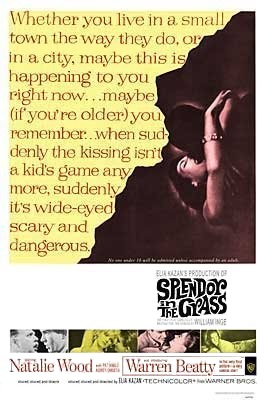What though the radiance which was once so bright
Be now for ever taken from my sight,
Though nothing can bring back the hour
Of splendour in the grass, of glory in the flower;
We will grieve not, rather find
Strength in what remains behind…
— “Ode: Intimations of Immortality from Recollections of Early Childhood” by William Wordsworth
The 1962 film, Splendor in the Grass, takes place in Kansas shortly before the start of the Great Depression. Deanie (Natalie Wood) and Bud (Warren Beatty) are two teenagers in love but, as we learn, youthful love does not always translate into adult happiness.
Bud and Deanie are idealistic and in love but they’re from different social classes. Bud is the son of a boisterous oilman named Ace (Pat Hingle) and Ace acts much like you would expect a millionaire named Ace to behave. Bud’s parents are determined that he attend Yale and that he marry someone else from a wealthy family. They don’t want him to turn out like his older sister, Ginny (Barbara Loden), who drinks, smokes, and is rumored to have recently had an abortion. Meanwhile, Deanie is repeatedly told by her mother that she must always remain a “good girl” and not give in to the temptation to have premarital sex with either Bud or any other boy. If she does, she’ll be forever branded a bad girl and she’ll pretty much end up with a reputation like Ginny’s.
(Interestingly enough, Ace doesn’t have any problem with Bud finding himself a bad girl, nor does he have a problem with taking his son to a speakeasy later in the film. As far as society in concerned, being “good” and following the rules only applies to women.)
Needless to say, things don’t work out well for either Deanie or Bud. Bud is so frustrated that Deanie won’t have sex with him that he dumps her and then has the first of several breakdowns. When Deanie’s attempt to win Bud back by acting more like Ginny fails, she ends up going out with a classmate named Toots Tuttle (Gary Lockwood). Nothing good ever comes from going out on a date with someone named Toots Tuttle. That’s certainly the case here as Deanie and Bud both struggle with the demands of a hypocritical society that expects and encourages Bud to behave in a certain way but which also condemns Deanie for having desires of her own. And, of course, the entire time that Bud and Deanie’s drama is playing out, we’re aware that the clock is ticking and soon the stock market is going to crash and change everyone’s lives forever.
It’s kind of a depressing film, to be honest. I’ve always found it to be rather sad. When we first meet them, Deanie and Bud seem as if they’re perfect for each other but, throughout the entire film, the world seems to be conspiring to keep them apart. By the end of the film, they’ve both found a kind of happiness but we’re painfully aware that it’s not the happiness that either one was expecting while they were still in school. The film suggests that type of happiness might be impossible to attain and a part of growing up is realizing that there is no such thing as perfection. Instead, there’s just making the best of wherever you find yourself.
There’s a scene in this film where Natalie Wood nearly drowns and it always freaks me out, both because of my own fear of drowning and the fact that it foreshadows what would eventually happen to Natalie in 1982. (The fact that Natalie Wood and Robert Wagner’s yacht was called “Splendour” doesn’t help.) Natalie herself was also deeply scared of drowning and just filming the scene undoubtedly took a lot of courage on Natalie’s part. But then again, Natalie Wood’s entire performance is courageous. Natalie Wood gives an emotional and intense performance as Deanie, holding nothing back and it’s impossible not to get emotional while watching her. Making his film debut, Warren Beatty is a bit of a stiff as Bud, though he’s certainly handsome and you can tell why Deanie would have found him attractive. (In high school, you always assume that the boring, handsome guys actually have more depth than they let on.) By the end of the film, you understand that Deanie deserved better than Bud. Then again, Deanie deserved better than just about everything life had to offer her. But Deanie survived and endured and made the best of what she was given because, really, what else could she had done? What other choice did she have?
For her performance in Splendor in the Grass, Natalie Wood received her second Oscar nomination for Best Actress. She lost to Sophia Loren for Two Women and …. well, actually, Loren deserved the award. But so did Wood. 1961 would have been a great year for a tie.
